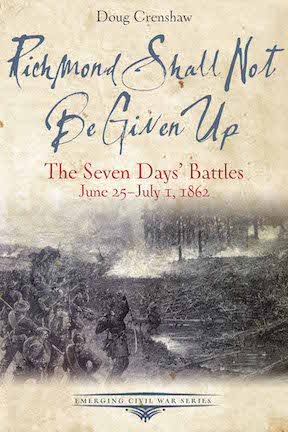The “Emerging Civil War Series” Series: Richmond Shall Not Be Given Up!
 It’s a story familiar to many of us. An uncle took me to a battlefield when I was six, and I was hooked—only it wasn’t Gettysburg! It was Cold Harbor and the fields of the Seven Days battles. Every year for Christmas he sent me a book from the “General” to the “Colonel,” my favorite gift every year! Sadly, he passed away when I was 13, and I moved on to typical teenage interests. It was only later, when I moved to Virginia, that the fever hit me again. I began reading intensely, and when I discovered that my family had owned land at Beaver Dam Creek and Malvern Hill during the battles, I was completely sold.
It’s a story familiar to many of us. An uncle took me to a battlefield when I was six, and I was hooked—only it wasn’t Gettysburg! It was Cold Harbor and the fields of the Seven Days battles. Every year for Christmas he sent me a book from the “General” to the “Colonel,” my favorite gift every year! Sadly, he passed away when I was 13, and I moved on to typical teenage interests. It was only later, when I moved to Virginia, that the fever hit me again. I began reading intensely, and when I discovered that my family had owned land at Beaver Dam Creek and Malvern Hill during the battles, I was completely sold.
In 2009, I began volunteering with the Richmond National Battlefield Park, and loved the process of helping people understand the events and places of Richmond during the Civil War. For some reason, the urge to write a book hit me, and Ashley Luskey, then an NPS ranger, said I should attack Fort Harrison. Digging into the research was so interesting and fun! That was followed by a book on the battle of Glendale.
Shortly thereafter, Bert Dunkerly suggested that I check out Emerging Civil War, so I attended a Symposium and was knocked out. The speakers were really good, everyone was friendly, and I bought some books, which were excellent. I wanted to be part of that! After writing some articles for the blog, I approached Chris Mackowski, and he was very encouraging and accepted my offer to write a book on the Seven Days.
The ECW process was quite different than what I was used to. Over 150 images were needed and lots of maps, but I loved it. This was the perfect vehicle for what I wanted to do: help people understand the campaign in a brief format and include a driving tour.
Writing a book means research, and research leads to questions. Why was Stonewall Jackson really late at Mechanicsville? Why did A. P. Hill attack there without support? Was he really as rash as his reputation leads us to believe? Why did he attack at Gaines’s Mill without support? How could McClellan have possibly escaped? How did Malvern Hill get so fouled up? One question always seemed to lead to another, deeper one. Absolutely fascinating.
I discovered that I really liked the writing process, and Chris M., Chris Kolakowski and Bert Dunkerly were great guides. Chris M. even drove down and helped take pictures and explained how to make them more interesting. Kris White showed up the same day. They were so generous with their time!
If you have never experienced the editing process, it can be a bit humbling. You think you have done your best work, but suggestions come in, and you grow as a historian and as a writer. I have found that people in the field generally are very helpful and want you to succeed, and it’s encouraging! A lot of work goes on in areas most readers don’t think about: re-writing, proofing, and so on. When you are new and turn in your first manuscript, you think you are finished. You’re not. There is much left to do, but the end result is so worth it!
The book was well-received, and a lot of public talks followed. Comments and reviews were very motivating. Of course, this leads to the urge to write again, but that’s a story for another blog….
————
Richmond Shall Not Be Given Up: The Seven Days’ Battles, June 25-July 1, 1863
by Doug Crenshaw
Savas Beatie, 2017
Click here to read more about the book, including a book description, reviews, and an author bio.

Doug, I’d like to know what you think of the book extraordinary circumstances by Brian K. Burton. I’d also like to hear from you so please contact me at 202–5 56–8483
Doug:
Interesting insights. This one is an essential piece on the book shelves of the OOWTPC (Order of the Obsessed With The Peninsula Campaign). So, as I’m sure you’d guess, we’re anticipating the sequel that’s in the works.